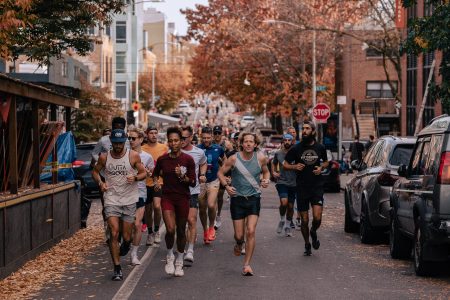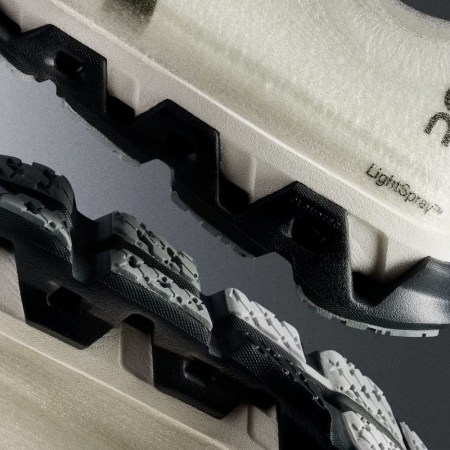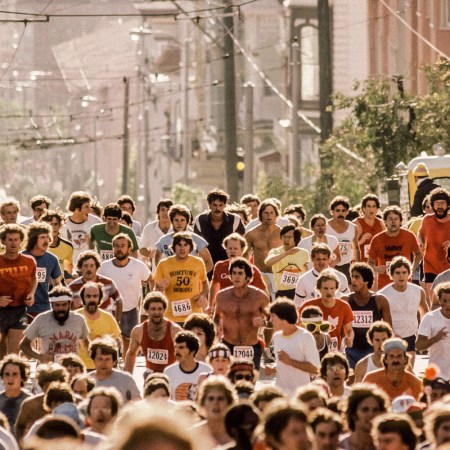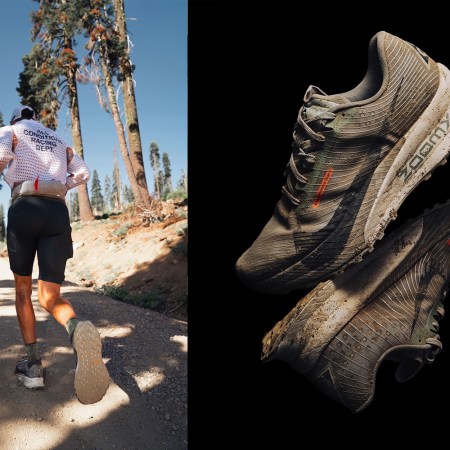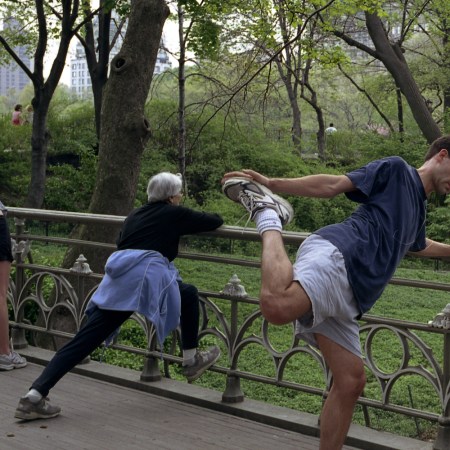Time, it’s been said, is a flat circle. That’s truer for the inmates who are members of San Quentin State Prison’s 1000 Mile Club than it is for most, as they spend a good chunk of their time running tedious circles around a makeshift track in the institution’s crowded exercise yard in order to prepare for the 105-lap marathon that’s run within the well-guarded walls of the California maximum facility each November.
Founded in 2005 and coached and sponsored by Marin County’s Tamalpa Running Club, the 1000 Mile Club and its approximately 50 members, many of whom are facing life sentences with little chance of parole, are the subject of a new documentary 26.2 to Life that is set to premiere on ESPN tonight. The winner of more than a dozen festival awards, the film came to life over the course of six years of director Christine Yoo visiting and documenting San Quentin.
In addition to capturing club members training for their 26.2-mile trek with the help of their coaches as well as the marathon itself, Yoo’s 1.5-hour documentary chronicles what everyday life at San Quentin is like for the inmates who live there. A runner herself, Yoo was inspired to make the film after reading an article about the marathon prompted her to pay a visit to San Quentin.
“I’m not a marathoner, but I understand that feeling of freedom you get when you run. It’s always been a creative space for me to find peace if I’m having issues or problems. So I asked to go to the prison, and the day I went there was a half-marathon event,” Yoo tells InsideHook. “It kind of turned every notion I had about prison. Going down into the yard and seeing the volunteers, it was almost festive. That feeling of festivity inside a prison, that juxtaposition, was not something I was trying to reconcile. As I continued my research talking with the guys and coaches, I was really overwhelmed with the amount of information I was getting. I felt I needed to tell this story.”
Ahead of 26.2 to Life debuting for a national audience and streaming thereafter, we spoke with Yoo about her film and what she hopes it might accomplish.
InsideHook: Did you set out to make the connection between running a marathon and serving a life sentence?
Christine Yoo: To me, a marathon was a metaphor for doing time in prison and the question I went into this wanting to answer is what’s life like with a life sentence. As most runners know, you feel like if you can do one mile then maybe you can do two miles. It becomes this gradual process. What really struck me was the power of not only the transformative practice of running itself within this type of setting, but also how transformative belonging to a community can be. You have to remember, the people who are in prison are regarded as society’s failures. They’ve never set a positive goal for themselves or completed anything. For guys who suddenly feel they can run five miles, it’s a huge confidence booster. They take that confidence and start thinking about a GED.
Tracksmith’s First NYC Store Arrives With the Brand’s First-Ever Running Shoe
Tracksmith’s first brick-and-mortar location in New York is coming to WilliamsburgIH: The film won a number of awards on the festival circuit. Why do you think it resonated so strongly?
CY: I think the film takes you inside a world people really haven’t seen before. We all have impressions of prisons, certainly I did, and usually prison films are pretty depressing. This was a surprisingly inspiring story. Who doesn’t like to be inspired, especially by people who are forgotten by society but haven’t given up hope? I think there’s a resonating message in that. Media makers have largely dehumanized a lot of people in prison. Maybe it’s just a different look.
IH: Were the members of the 1000 Mile Club proud to have you document their accomplishments on film?
CY: They definitely were proud. These are men who are forgotten and have been labeled by society as the worst. They did want to show an outsider, but at the same time were very suspicious because most media goes in trying to get a specific soundbite. I spent every moment I could inside that prison when we weren’t filming as well. I would go in for workouts and also became a volunteer at the prison. I became kind of a regular fixture at the prison and I think somebody people felt safe sharing their stories with.

IH: Is there a takeaway you’d like viewers of the film to walk away with them?
CY: Most of these guys had one really, really bad day that netted them with a life sentence. Many of them didn’t have access to educational opportunities, didn’t have family structure or had severe drug problems. We all have choices, but there are lots of systematic environmental factors that lead people to criminality. Data shows that people age out of crime over time. You do stupid shit when you’re young. With the way our justice system is, many people who may have changed over time will never get the opportunity to share that transformation in a community they could really help. The Thousand Mile Club has a 0% recidivism rate. The national average is like 67%. For these guys, rehabilitation works. Why? If you have a community of people you feel like you belong to, you are going to be accountable to. If you don’t feel like you belong and there are no consequences, you’re going to become a sociopath. I think that 0% recidivism rate is a really undeniable statistic.
IH: Are you hoping there will be other prisons that will incorporate a program like the 1000 Mile Club?
CY: We had a screening at San Quentin and it really reinforced to my team that we needed to get the film into as many prisons as possible. After the film screened at San Quentin, the membership of the club itself exploded to about a hundred guys. There’s a waiting list now for people wanting to volunteer. So I donated the film to the California Department of Corrections and it’s been screening across their prisons via a closed circuit TV system.. A new running club started in Salinas Valley Prison with the San Francisco Probation office. Then we had the film screened in some prisons in Ohio. I just got word that one of the women’s prisons we screened at three weeks ago started their first running club. The coaches are developing a handbook now about starting a prison running club. I’m not trying to say running is going to solve an incarceration problem, but it’s very encouraging.
The Charge will help you move better, think clearer and stay in the game longer. Subscribe to our wellness newsletter today.

